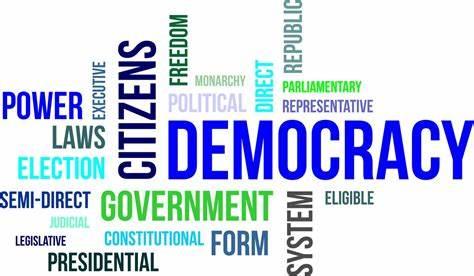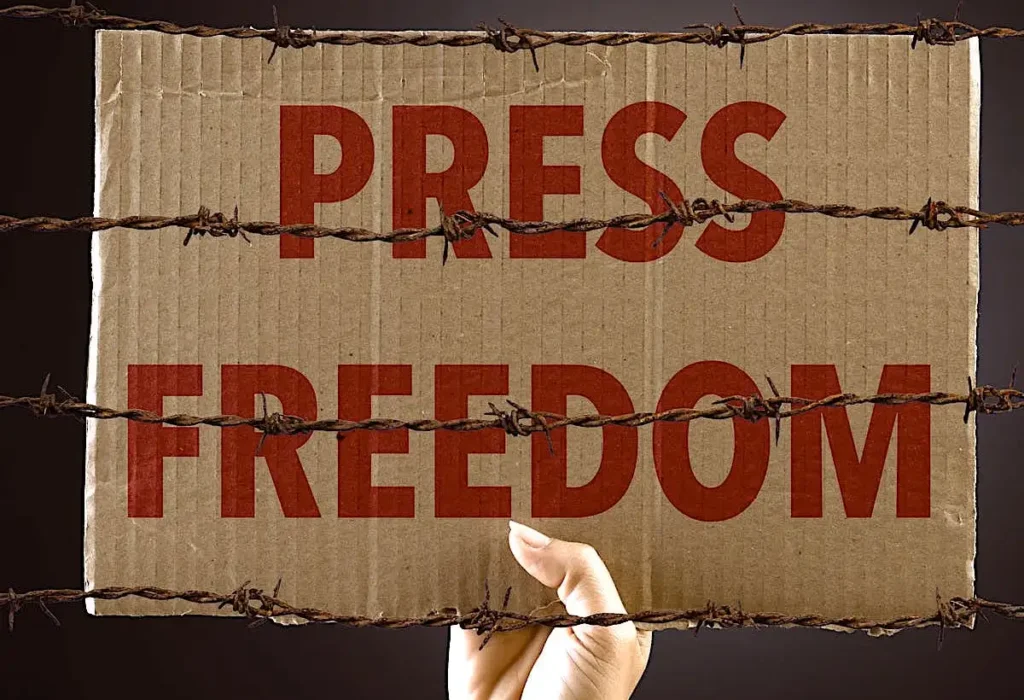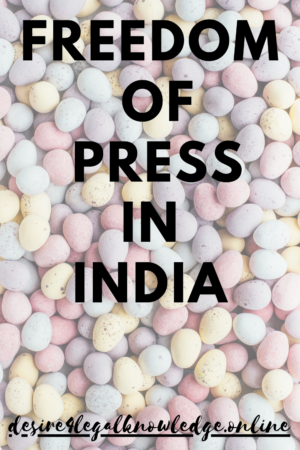Impact of social media on the Freedom of Press.
Table of Contents
Introduction
Freedom of Press is the most talked about topic in today’s society. The rise of social media platforms has fundamentally changed the way that information is disseminated and consumed around the world. In particular, social media has had a profound impact on the role of the press and how it functions in society. On one hand, it has given journalists and news organizations new tools to reach a wider audience and to break stories more quickly than ever before.
On the other hand, social media has also created new challenges and threats to the freedom of press, from disinformation campaigns to censorship by governments and private companies. In this context, it is important to examine the complex and evolving relationship between social media and the freedom of press, and to consider what steps can be taken to protect and strengthen the role of the press in the digital age. It is very necessary to guarantee the freedom of press in a democratic country for having a check on the present Government.
Role of social media in the freedom of Press
The Role of social media in the Freedom of Press is a complex and multifaceted topic that encompasses a range of issues related to the intersection of digital technology and journalism. Some of the key areas that can be explored in this topic include:
- The democratization of the media: Social media platforms have given ordinary citizens the ability to create and distribute news content, breaking down traditional barriers to entry into the media industry. This has led to a more diverse and decentralized media landscape but also poses challenges in terms of ensuring the quality and accuracy of news reporting and the freedom of press.
- The impact of social media algorithms: Its algorithms are designed to show users content that is most likely to keep them engaged on the platform. This can create a “filter bubble” effect, where users are only exposed to news and information that confirms their existing beliefs and biases. This has implications for the role of the press in providing a diversity of perspectives and holding power to account, thus, adding to the freedom of press.
- The spread of disinformation: It has enabled the rapid spread of false or misleading information, creating challenges for journalists in terms of fact-checking and verifying sources. This has also created opportunities for malicious actors to spread propaganda and manipulate public opinion. In this context there should be certain limitations on the freedom of press.
- The role of social media companies: Social media companies such as Facebook and Twitter have become powerful gatekeepers of news and information, with the ability to censor content or manipulate what users see. This raises questions about the balance between protecting free speech and protecting the public from harmful or misleading content.
- The challenges of monetizing journalism: It has disrupted traditional business models for journalism, with many news organizations struggling to generate revenue in the digital age. This has created pressures to prioritize clicks and engagement over quality reporting and has raised questions about the sustainability of independent journalism.
Overall, the role of social media in the freedom of press is a complex and rapidly evolving topic that requires careful consideration of the opportunities and challenges posed by digital technology.
The democratization of the media
The democratization of the media refers to the way in which digital technology and social media platforms have made it easier for ordinary people to create and distribute news content. In the past, the media industry was dominated by a small number of large corporations, who controlled the distribution of news and information. This created a high barrier to entry for new players in the industry, making it difficult for independent journalists and small-scale publishers to compete.
Today, however, anyone with a smartphone and an internet connection has the potential to become a content creator and distributor. Social media platforms such as Twitter, Facebook, and YouTube have created new channels for news dissemination that bypass traditional gatekeepers and intermediaries. This has led to a more diverse and decentralized media landscape, with a wider range of voices and perspectives represented.
The democratization of the media has also led to new forms of citizen journalism, where ordinary people are able to capture and report on events in real time using their mobile devices. This has had a particularly significant impact on coverage of protests, disasters, and other events that are often underreported by mainstream media outlets.
However, the democratization of the media also raises questions about the quality and accuracy of news reporting. With so many sources of information available, it can be difficult for audiences to distinguish between reliable and unreliable sources. Additionally, the lack of editorial oversight on social media platforms can make it easier for false or misleading information to spread.
Overall, the democratization of the media is a double-edged sword, creating both opportunities and challenges for the freedom of press. While it has opened up new channels for independent journalism and increased access to information, it has also created new challenges in terms of quality control and media literacy.


The Impact of social media algorithms
Social media algorithms are powerful tools that are designed to show users content that is most likely to keep them engaged on the platform. These algorithms use a variety of signals, such as past user behavior and demographics, to determine which content to display in a user’s news feed or search results. While these algorithms can help its platforms to retain users and increase engagement, they also have important implications for the role of the press and the diversity of information available to the public.
One of the key impacts of social media algorithms is the creation of “filter bubbles.” When users are only shown content that confirms their existing beliefs and biases, they may be less likely to be exposed to alternative perspectives or to engage in critical thinking. This can create a polarized and fragmented media environment, where different groups have vastly different understandings of the same events or issues.
Social media algorithms can also have important implications for the role of the press in a democratic society. When news content is prioritized in favor of other forms of content that are more likely to generate engagement, it can become more difficult for journalists to reach a wide audience and to hold power to account. Additionally, the use of algorithms to determine which news stories are displayed in users’ feeds can create a feedback loop, where stories that are already popular are given even more visibility, while lesser-known stories are buried.
There are also concerns that social media algorithms may be susceptible to manipulation and bias. For example, there have been allegations that these platforms have been used to spread disinformation and propaganda, or to amplify certain voices over others.
Overall, the impact of social media algorithms on the freedom of press is a complex and multifaceted issue that requires careful consideration of the trade-offs between user engagement, diversity of information, and the role of the press in a democratic society.
The spread of disinformation
The spread of disinformation through these platforms is a growing concern for the freedom of the press. Disinformation refers to false or misleading information that is spread with the intention of deceiving or manipulating people. Disinformation can take many forms, including fake news stories, doctored images or videos, and memes that distort the truth.
Social media platforms have created new opportunities for disinformation to spread rapidly and widely. The ease of sharing information on social media, combined with the algorithms that prioritize popular and engaging content, can make it difficult for users to distinguish between reliable and unreliable sources. Additionally, these platforms have been used by malicious actors to create fake accounts, spread false information, and manipulate public opinion.
The spread of disinformation has important implications for the freedom of the press. When false or misleading information is disseminated through these platforms, it can undermine the role of journalists in providing accurate and trustworthy news coverage. Disinformation can also create confusion and mistrust among the public, making it more difficult to have productive debates and discussions about important issues.
To address the spread of disinformation, there are a number of strategies that can be employed. These include improving media literacy among the public, developing fact-checking tools and resources, and increasing transparency around the algorithms and processes that social media platforms use to determine which content to display.
Overall, the spread of disinformation is a complex and pressing issue for the freedom of press. As social media continues to play an increasingly important role in the distribution of news and information, it is important to develop effective strategies for identifying and countering disinformation.
The role of social media companies
Social media companies play a crucial role in shaping the freedom of the press in today’s digital age. As the gatekeepers of online communication, these companies have immense power over what information is seen by the public and how it is disseminated. In recent years, these companies have faced increasing scrutiny over their role in the spread of disinformation, hate speech, and other forms of harmful content.
One of the key responsibilities of these companies is to ensure that their platforms are not being used to spread false or misleading information. This can be done through a variety of mechanisms, including fact-checking, algorithmic adjustments, and content moderation. By actively working to limit the spread of disinformation and other harmful content, these companies can help to maintain the integrity of public discourse and promote the free exchange of ideas.
Social media companies also have a responsibility to protect the privacy and security of their users. This includes safeguarding personal data from third-party access and ensuring that user data is not being used to facilitate harmful or discriminatory practices. In recent years, these companies have faced increasing scrutiny over their handling of user data, particularly in the wake of high-profile data breaches and scandals.
Finally, social media companies have an important role to play in promoting diversity and inclusion online. By actively working to amplify underrepresented voices and creating spaces for marginalized communities to connect and engage, these companies can help to create a more vibrant and inclusive public sphere.
Overall, the role of social media companies in shaping the freedom of press is complex and multifaceted. While these companies have immense power over online communication, they also have a responsibility to ensure that their platforms are being used in ways that promote the public interest and protect the rights of all users.


The challenges of monetizing journalism
Monetizing journalism is a major challenge facing the media industry today. As traditional advertising models have declined in the face of competition from digital platforms, news organizations have struggled to find sustainable revenue streams to support their journalism. This has led to a number of challenges for the freedom of the press, as news organizations are forced to cut staff, reduce coverage, and rely on clickbait and sensationalism to attract readers.
One of the main challenges of monetizing journalism is the rise of ad-blocking software. As more and more internet users install ad-blockers to avoid intrusive or irrelevant ads, traditional advertising models have become less effective. This has forced news organizations to explore alternative revenue streams, such as subscriptions, sponsorships, and philanthropic funding.
Another challenge facing the monetization of journalism is the dominance of digital platforms like Facebook and Google. These platforms have come to control a significant portion of the digital advertising market, making it difficult for news organizations to compete for ad revenue. Additionally, these platforms have been accused of siphoning off traffic and revenue from news organizations, leading to a decline in overall revenue and a weakening of the news ecosystem.
Finally, the challenge of monetizing journalism is closely tied to the broader economic and political trends that are shaping the media industry today. As the public’s attention spans shorten and the news cycle accelerates, news organizations are forced to prioritize quick-hit stories and clickbait content over more substantive, investigative journalism. This can have important implications for the quality and accuracy of news coverage, as well as for the role of the press in promoting transparency and accountability, thus, adding to the freedom of press.
Overall, the challenges of monetizing journalism are significant and require creative and innovative solutions. As news organizations continue to adapt to the changing media landscape, it will be important to prioritize sustainable revenue streams that allow for high-quality, independent journalism to thrive.
Conclusion
In conclusion, the role of social media in the freedom of press is complex and multifaceted. While these platforms have given rise to new opportunities for media democratization and increased public participation in the news, they have also posed significant challenges to the integrity of public discourse and the free exchange of ideas.
The spread of disinformation and the impact of social media algorithms are just two of the many challenges that must be addressed in order to safeguard the freedom of the press in the digital age. Moreover, the role of these companies in promoting diversity, inclusion, and privacy is crucial in ensuring that online communication remains accessible and equitable for all.
As we continue to grapple with the challenges and opportunities presented by social media, it will be important to work towards solutions that prioritize the public interest, promote transparency and accountability, and protect the fundamental rights of all users. By doing so, we can help to ensure that social media remains a force for positive change in our increasingly connected world. Thus, social media plays a significant role in freedom of press.
FAQs
Can social media platforms restrict or censor press freedom?
Social media platforms have the ability to restrict or censor content, which can impact press freedom. While platforms may enforce community guidelines or terms of service, there is concern about potential bias or inconsistent application, leading to the suppression of certain viewpoints. Striking a balance between combating misinformation and preserving freedom of the press is an ongoing challenge, requiring careful consideration of ethical and legal principles.
Are journalists and media organizations facing new challenges or threats due to social media?
Journalists and media organizations face new challenges and threats due to social media. The fast-paced nature of social media can create pressure to report quickly, potentially compromising accuracy and thorough fact-checking. The spread of misinformation and disinformation on social media platforms also poses challenges for journalists in ensuring the credibility of their reporting. Additionally, online harassment, threats, and targeted campaigns against journalists have increased with the rise of social media, posing risks to their safety and freedom of expression.

